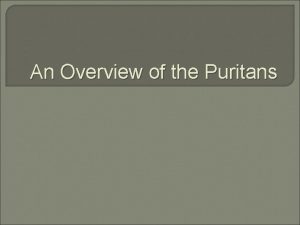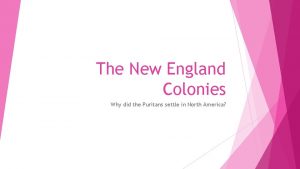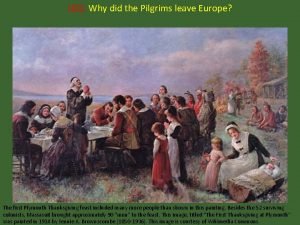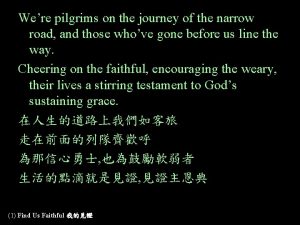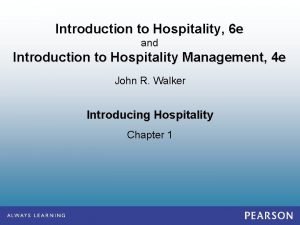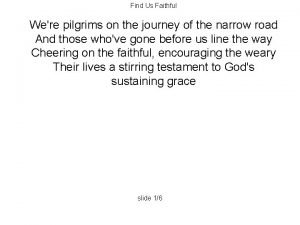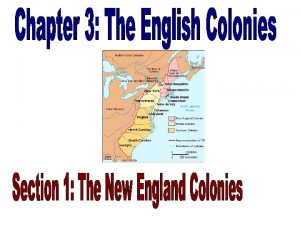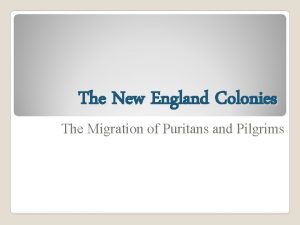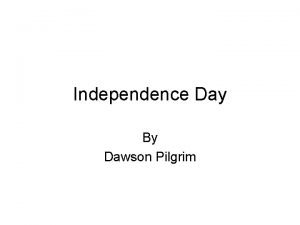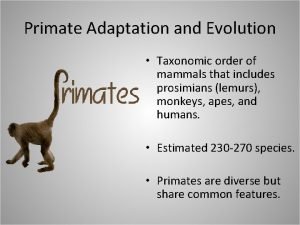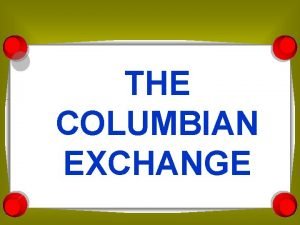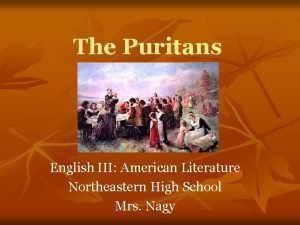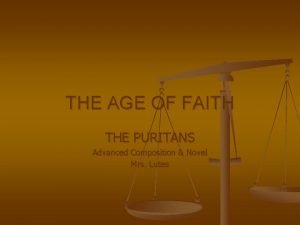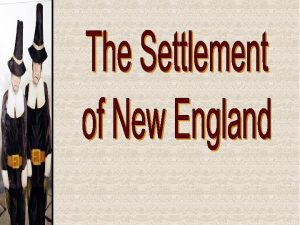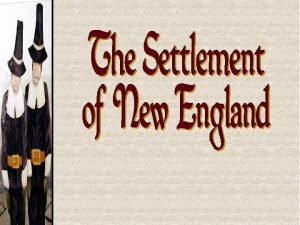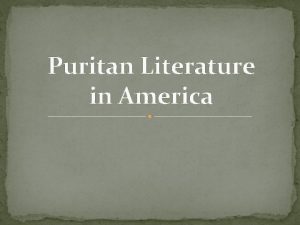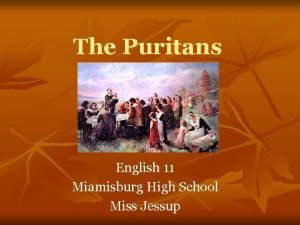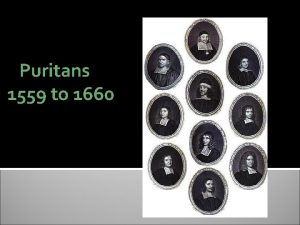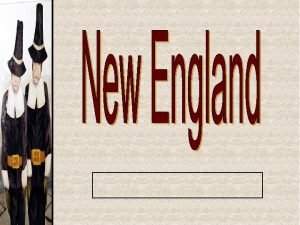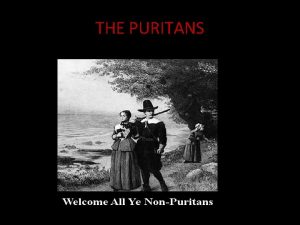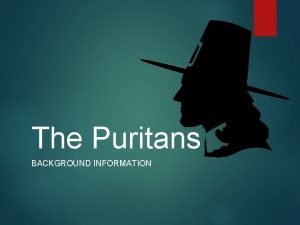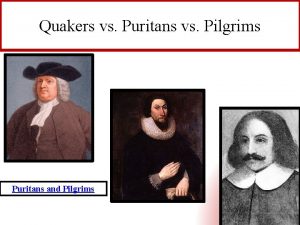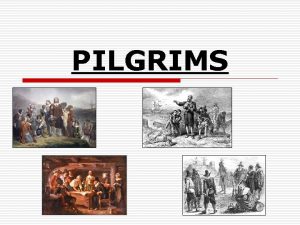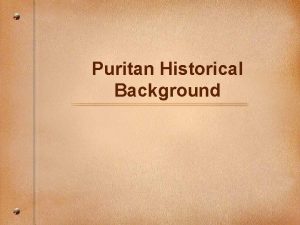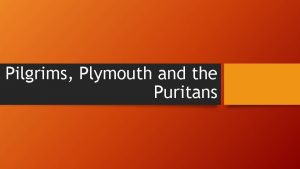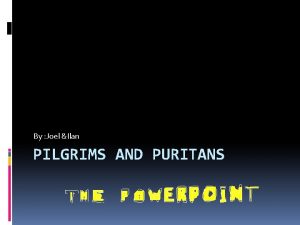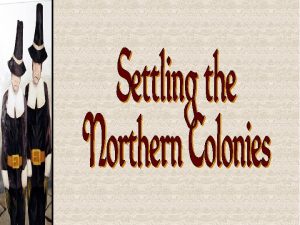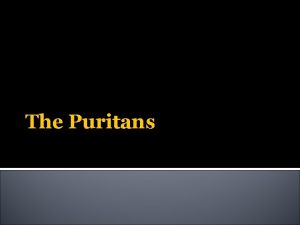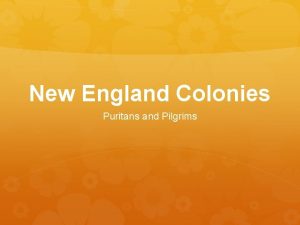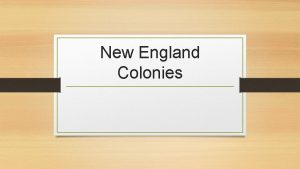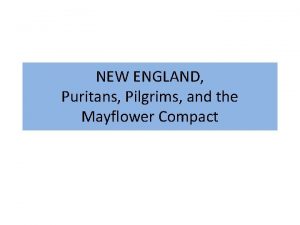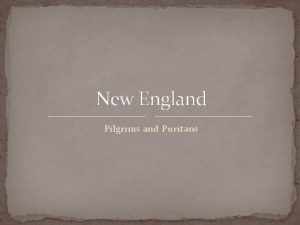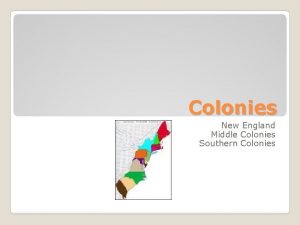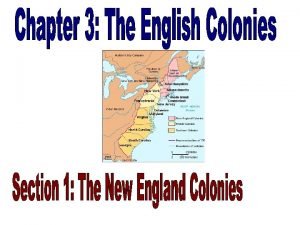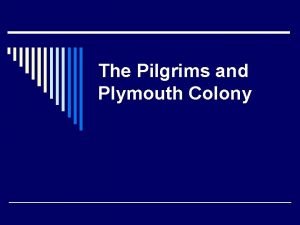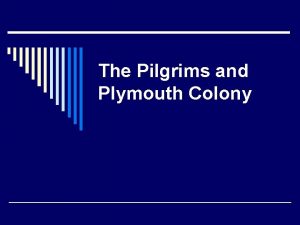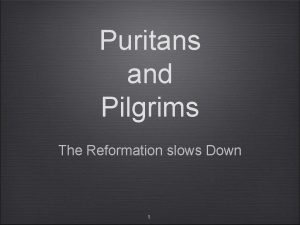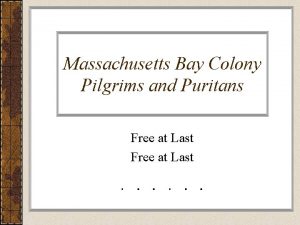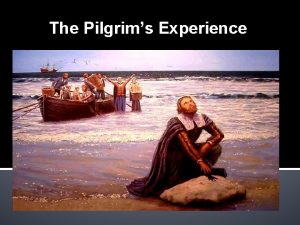Pilgrims Puritans 13 Colonies The New World With

























- Slides: 25

Pilgrims, Puritans, 13 Colonies The “New World “With New People

The Pilgrims The first group of Puritans that came to the “New World” were the Separatists. We usually refer to them as the Pilgrims, they referred to themselves as “Saints” Separate from Church of England Moved to Holland before coming to the “New World”

The Mayflower 1620 The Virginia Company gave them permission to establish a settlement. A prominent merchant advanced them funding for the journey

The Journey Started out in Two ships with another group-The Strangers The Speedwell started to leak Delay put them in the middle of the storm season

Land They were in the wrong place They were set suppose to land in Virginia but landed in Massachussetts

Problems and Solutions Conflict The “Strangers” wanted to leave the “Saints” Both groups wanted to be a legitimate colony Solution 41 of the Saints and Strangers drafted and signed a document they called the Mayflower Compact. This Compact promised to create a “civil Body Politick” governed by elected officials and “just and equal laws. ” It also swore allegiance to the English king.

Puritans 10 years after the Mayflower, a group of Puritans, led by John Winthrop landed in New England Established the Massachusetts Bay Colony Still loyal to the Church of England, believed they could purify the behavior of individuals (purify the Church from within).

‘City upon a Hill’ (Modified) The only way to provide for our posterity is to do justly, to love mercy, and to walk humbly with our God. We must be knit together in this work as one man; we must take care of each other with brotherly affection. We shall be united in the bond of peace, the Lord will be our God and delight to dwell among us, so that we shall see much more of his wisdom, power, goodness and truth. We shall be as a City upon a Hill, the eyes of all people are upon us; so that if we shall [behave badly] and cause God to withdraw his help from us, we shall [invite] the mouths of enemies to speak evil of the ways of God, and cause their prayers to be turned into curses upon us. Therefore let us choose life, that we, and our [children], may live; by obeying his voice, for he is our life, and our prosperity. Vocabulary: Posterity: future generations Prosperity: wealth Source: John Winthrop (1588– 1649), lawyer and leader of the 1630 migration of English Puritans to Massachusetts Bay Colony, delivered this famous sermon aboard the Arbella to settlers traveling to New England.

‘The Divine Right to Occupy the Land’ (Modified) The Bible says: “I will appoint a place for my people Israel, and I will plant them, that they may dwell in a place of their own, and move no more. ” The settling of a people in this or that country is the Lord’s decision. Now, God makes room for a people in three ways: First, He drives out the heathens before them by waging war on the inhabitants. Second, He gives a foreign people favor in the eyes of any native people to come and sit down with them. Third, He makes a country empty of inhabitants where the people will live. Where there is an empty place, the sons of Adam and Noah are free to come and live there, and they neither need to buy it nor ask permission. Vocabulary: Heathen: a term used at this time to describe anyone uncivilized and who did not believe in God Appoint: assign; decide on Inhabitants: people who live in a certain place Source: Puritan leader John Cotton gave the following sermon to members of his congregation who were immigrating to America in 1630. Cotton became a respected and influential clergyman in the Massachusetts Bay Colony.

New England Colonies New Hampshire Massachusetts Rhode Island Connecticut

Massachusett s Founder- John Winthrop-Massachusetts Bay Reason for colonization-Religion Interesting Facts- Salem Witch Trials, dominated by the Puritans who refused to tolerate any religion outside their own. • Economic Base- fishing, livestock, lumber, and shipbuilding. • • •

Connecticut Founded Thomas Hooker 1636 Reason for Colonizing-Religious, it was for Puritan Noblemen Interesting Facts- Originally settled by the Dutch, The Fundamental Orders of Connecticut influenced the Declaration of Independence Economic Base-shipbuilding, whaling, fishing, timber, fur trading, livestock, and maple syrup.

Founder-John Mason 1638 Economic Base- Ship Building, Fishing, Whaling Interesting Fact-The New England Colonies, including the New Hampshire Colony, were dominated by the Puritans who refused to tolerate any religion outside their own. Reason for Colonizing. Religious •

Rhode Island Founder- Roger Williams and others, Anne Hutchison Reasons for Colonizing- Religious founded by those who wanted to escape the lack of religious tolerance found in the other New England colonies. Its founder Roger Williams was a former colonist and religious exile from the Massachusetts Colony Interesting Facts- founder paid the Indians for their land Economic Base-fishing, whaling, manufacturing of ships, rum manufacture and export, and some farming.

New York New Jersey Pennsylvania Delaware

New York Peter Minuit Settled for Economic opportunity. Trade Originally settled by the Dutch in 1626 but surrendered to the English in 1664 Originally called New Amsterdam by the Dutch, it was later changed to Province of New York after the Duke of York Economic-Trade- agricultural land, coal, furs, forestry (timber), and iron ore.

New Jersey Founded by Lord Berkeley and Sir George Carteret Founded for Farming and Trade-Profit Attracting people to the area by offering land guaranteeing religious freedom. Economic- Trade- Iron ore. They used it to manufacture items to export to England such as tools, kettles, nails, plows, and nails.

Pennsylvania Founded by William Penn (A Quaker) Pennsylvania Colony was based on religious beliefs. Dominated by Quakers but there was religious freedom. Philadelphia known as “The City of Brotherly Love”. Literally means brotherly love in Greek. The reason that King George II gave William Penn such a large area in the New World was because he owed William's father a large amount of money. Exported iron ore, furs, timber and manufactured iron products to England, including tools, plows, kettles, nails and other items.

Economic Baseagriculture, timber, iron, and trade. Founded by Peter Minuit Reasons for settling were for economic gain-agriculture and trade Often referred to as the breadbasket colony. The colony grew a lot of wheat (which is used to make bread), and after being ground into flour it was exported to England.

Southern Colonies Virginia Maryland North Carolina South Carolina Georgia

Virginia Founded by-John Smith Reasons for colonizing was for economic opportunity- Tobacco The Virginia Colony's name was chosen in honor of Queen Elizabeth I, who was also often referred to as the 'Virgin Queen’. Economic Base was agriculture -great soil and long growing seasons.

Maryland Cecil Calvert and Lord Baltimore Founded for Religious Freedoms. Catholic It originally covered approximately 12 million acres. It is approximately half that today. Settled mostly by Catholics. Agriculture-Plantations grew tobacco, cotton, corn, vegetables, grains, and fruit. Livestock was also commonly raised

North and South Carolina Founded by English Settlers Charles II of England rewarded eight men for their faithful support of his efforts to regain the throne of England by granting them the land called Carolina. -Economic Gain In 1712 the original colony was divided into North and South Carolina. In 1729 the South Carolina Colony became a royal colony. The South Carolina Colony plantation grew a variety of crops including cotton, tobacco, vegetables, fruit, and livestock.

Georgia James Oglethorpe Settled because the British government wanted to protect South Carolina from invasion by the Spaniards from Florida and by the French from Louisiana. James Oglethorpe's desired to establish a refuge for Protestants being persecuted and as a place for the less wealthy Europeans and debtors wishing to establish themselves in the colonies. The only religion not welcome in the Georgia Colony was the Roman Catholic religion. Agriculture-vegetables, grain, fruit, corn, cotton, tobacco, and livestock.

What do they have in common? What do the New England Colonies have in common? (Economically, Religiously, Why they were settled). What do the Middle Colonies have in common? (Economically, Religiously, Why they were settled). What do the Southern Colonies have in common? (Economically, Religiously, Why they were settled).
 Puritans vs. pilgrims
Puritans vs. pilgrims Why did the puritans settle in new england
Why did the puritans settle in new england Why did pilgrims leave europe
Why did pilgrims leave europe Were pilgrims on a journey of a narrow road
Were pilgrims on a journey of a narrow road Pineapple tradition
Pineapple tradition Oh may all who come behind us find us faithful
Oh may all who come behind us find us faithful Seaft
Seaft Pilgrims
Pilgrims Pilgrims
Pilgrims Pilgrims independence day
Pilgrims independence day Primate opposable thumb
Primate opposable thumb Did pumpkins come from the new world or old world
Did pumpkins come from the new world or old world Puritans religion beliefs
Puritans religion beliefs Puritans beliefs
Puritans beliefs Puritan vs separatist
Puritan vs separatist Separatists vs non separatists
Separatists vs non separatists Separatists vs puritans
Separatists vs puritans Puritanism definition literature
Puritanism definition literature Puritan beliefs
Puritan beliefs Puritans beliefs
Puritans beliefs Quotes about puritans
Quotes about puritans Virginia company
Virginia company Total depravity puritans
Total depravity puritans Puritans tulip
Puritans tulip Protestants vs puritans
Protestants vs puritans Puritans background
Puritans background
